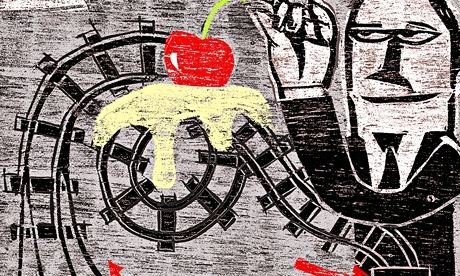Network Rail’s £34bn debt has helped private companies to make huge profits. And now we’re ordered to pick up the bill

Congratulations, dear reader! As of this morning, you have racked up an extra £539 in debt. No, you haven’t just bought a new wardrobe. You haven’t made a deposit on a winter break. And it’s not because of that heavy eBay session where you overbid for a signed Bulgarian copy of Wet Wet Wet’s first LP.
Nor are you alone. I’m another 539 quid in the red too – as are each of the other 63 million Britons. Put all those sums together and the entire country has just lost £34bn. How did we manage that? The short answer is that some statisticians made it so. The Office for National Statistics has decided that, under new accounting rules, Network Rail can no longer be called a private company. It was always borrowing on the state’s behalf, and if anything went wrong with Network Rail, it was always going to be taxpayers who would be on the hook. So as of this week it goes on the public balance sheet, its £34bn of debt now indelibly inked next to our names.
Nor would you be alone if you haven’t heard about these extra tens of billions taken out in your name. It hasn’t come up much in the papers, or on the BBC. You might think that strange, given the huge amount involved and all those vows made by George Osborne about getting public debt down.
Then again, the hush fits perfectly with what that £34bn represents – because it’s hush money. It’s part of the secret subsidy that you, me and everyone else in Britain has handed over to the train operators to keep them in business. For years, Network Rail has been shelling out for new railway lines and stations refurbs using public money. The fruits of our generosity have been enjoyed by the private train businesses.
On this very page last August, Ian Birrell attacked critics of rail privatisation for not seeing the commuting miracles wrought. “When I travel from London to watch my football team, Everton, play at home, the average journey time to Liverpool is now 37 minutes quicker than when rail was privatised.” Well, yes, Ian: that’s because taxpayers paid £9bn for the privilege.
What’s more, Network Rail has also been keeping down track access charges – the rent that Arriva, TransPennine and the rest pay to use our railways. All this, by the way, is on top of the cash the government hands out directly to each of the firms.
Imagine having a landlord who did up your flat, chucked in a wetroom and some top-of-the-range white goods – then reduced your rent, so that he was really paying you to live there. You have just dreamed up Britain’s privatised rail network. Except it’s not all that private. Instead, you could call it the Great British Rake-Off: the state makes the investment; the train firms and their shareholders rake off the cash. And if the sums don’t work out, an operator can do the business equivalent of binning a runny baked Alaska by walking away – just as GNER did with the east coast main line.
For the rest, there are some lovely returns. Last winter, I asked academics at the Centre for Research on Socio-Cultural Change to tot up how much firms such as Virgin and First Group were making. They reported that in the financial year ending in March 2012, for each pound train operators invested, they were making £2.47 back. As I said at the time, find a bank account paying you that. That stupendous return on capital employed, as accountants refer to it, tells us that train companies invest very little but get a lovely flow of cash to send back to shareholders.
We’re meant to get into a choreographed huff about train fares. I can see why, when they’ve gone up 25% since Cameron took office. But to me, this is the greater scandal: the way we’re paying for private companies to make millions. The final kink in the system is that, from Arriva Trains Wales to London Overground, more and more of Britain’s train services are now run by German, French and Dutch state rail companies, who presumably direct the revenue from our fares back home. So taxpayers and commuters in the UK are paying for rail users on the continent to enjoy lower fares and better services.
If this is privatisation, I’m Richard Branson. All that’s happened this week is that the ONS has decided to end the charade. But what convolutions Labour and Tory politicians have gone through to stave off this day. Rather than criticise Network Rail bosses as they got stuck into the bonus trough, transport secretaries have kept mum so as not to demonstrate any public control over this pretend-private entity.
Rather than take democratic control over our money, the public is relegated to the role of a bystander. Despite embarking on a £38bn public-spending programme, despite heading for £50bn debt, Network Rail has no shareholders, and little parliamentary oversight: it is run by a small board who are supervised by 51 unelected lay members. This is of a piece with the manner in which Gordon Brown’s government practically killed itself to save RBS and Lloyds – then put its stakes in the arms-length UK Financial Investments, headed by a succession of bankers on sabbatical.
So, the Great British Rake-Off. It’s got TV potential: a true saga of how an entire political class pretends it has privatised the railways, even while pouring public money into the pockets of the privateers, then pretends otherwise to the public. Promises, pretence, subterfuge. And a ruddy great mess at the end.

